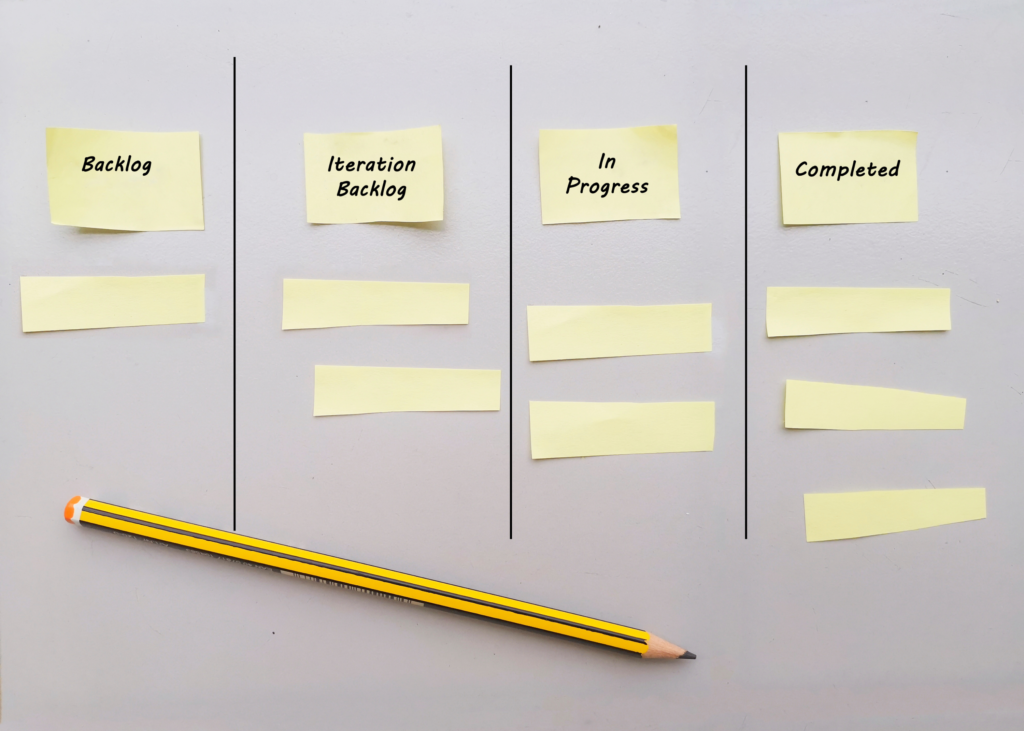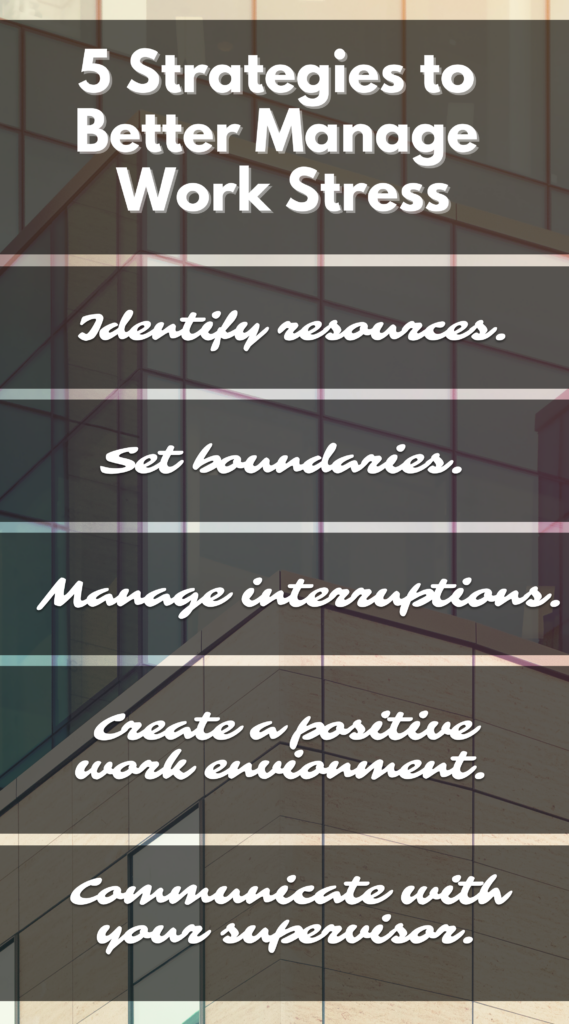While there are a number of strategies you can use to better manage your work stress, some situations can cause more stress than others. For example, the structure of a company can change significantly, causing strain if the change is not properly planned. Similarly, workplace bullying or harassment can cause stress, as team members feel they are not valued. It’s also stressful to feel that you have no say in how you’re treated by colleagues. Lastly, our current economic climate can be quite volatile and highly competitive. The impact of the COVID-19 pandemic and economic uncertainty may increase job insecurity and lead to increased workloads, further contributing to stress.

Identify Stress Resources
No matter the cause, identifying resources for coping with stress to manage it effectively will protect your mental well-being. You don’t have to be a doctor to identify your stress resources. In fact, your employer may even offer some. If you are not aware of the available resources, it may be time to seek out an employee assistance program. These programs are free and are designed to provide extra support for employees. To take advantage of these programs, managers must inform their teams of these resources and provide them with the information they need to enroll.
Employee assistance programs (EAP) may offer online resources, counseling, and referrals to mental health professionals. You may also consider talking to a psychologist if your job has become stressful. They may be able to provide tips to manage your stress and reduce unhealthy behaviors. For example, you might find it helpful to schedule time off from work for mental health or to spend time with friends and family.
Set Boundaries

Establishing boundaries for yourself and your workplace can help you better manage work stress and protect yourself. According to Cate Sevilla, author of “How to Work Without Losing Your Mind,” it is a positive message to your coworkers and supervisors if you set boundaries for yourself. Boundaries will help you maintain a reasonable workload and help you avoid burnout, leading to a healthier work environment. The consequences of not setting boundaries can be significant. For example, you may find yourself spending more time working than you need to, leading to mental and emotional distress.
Set times to check work notifications and emails. Notifications from work can interfere with your personal time, so it’s best to silence them at the end of the day or remove them from your personal device. By setting your boundaries and sticking to them, you will be much more likely to maintain a work-life balance.
Ask for help when needed. If you’re feeling overwhelmed or stressed, ask for help from a colleague or supervisor and be clear about what support you need.
Be honest about your workload. If you can’t take on another project, state this clearly and cite reasons why. If you feel you are being pushed to take on something you don’t feel you can manage, ask how you will be supported with the task and/or ask what the plans are for making your workload sustainable.
Communicate your boundaries. Be sure to communicate your boundaries with those around you so they can consistently respect them. For example, if you don’t take work calls/answer emails after hours, mention this when you return the phone call/email.
Manage Interruptions

Interruptions are an integral part of everyday life, affecting most people at one time or another. They can be in the form of phone calls, emails, pop-ins, instant messages, and even sudden, urgent deadlines. But there are ways to deal with interruptions, whether you want to accept them or cut them off entirely. Not everything is urgent! You can train yourself to ignore emails during certain hours, close the door to your office when working to meet a deadline, or ask a colleague to return later to discuss something non-urgent, for example.
Interruptions aren’t just about work; they can also impact our well-being. Fewer interruptions mean we get more done, which makes us feel more productive and efficient. That’s a good feeling! Disruptions can make us feel as though we haven’t accomplished anything and that most of our time is spent on unproductive activities. Making a priority list of interruptions as they arise will help you know exactly what you need to do next and keep you from dropping everything for each interruption that occurs.
Create a Positive Work Environment

Creating a positive work environment is important for a number of reasons. Not only does it encourage better employee morale, but it can also improve the company’s bottom line. A healthy workplace will encourage employees to contribute ideas and boost productivity. Furthermore, it will reduce the likelihood of absenteeism, workers’ compensation claims, and medical complaints. All of these benefits can help your business thrive.
Develop yourself as a manager. This is one of the best ways to avoid workplace stress. You can improve your skills and boost morale by taking the time to develop yourself. This will benefit your company’s bottom line and help you create a loyal team.
Communicate with employees about any changes or concerns they have. Don’t shy away from these important discussions. Employees should be informed about any changes in advance and have input on ways to deal with any problems they might encounter whenever possible.
Encourage breaks in the workplace. Breaks are a way to reduce stress and help employees perform better. The environment should also have a designated area for taking breaks and relaxation. This helps your employees manage their work better and keep them focused.
Communicate with Your Supervisor

Communicating with your supervisor can help you develop a stress management plan that will benefit you both personally and professionally. Employees who lack access to effective communication with their managers may be less likely to seek help. A good communication strategy includes bringing up a problem at work and asking for permission to carry out the solutions. This way, your manager will see you are serious about improving your work situation. You can also schedule follow-up meetings. Ultimately, this conversation may improve your health and well-being.
By communicating with your manager, you can potentially create habits to reduce your stress levels. Communication will help you avoid work-related stress and keep you focused on the tasks. If your boss knows how to communicate with his or her team members, then the latter will be able to give you the support you need.
What tips or strategies would you add to help you manage workplace stress? Share your thoughts below in the comments. We’d love to hear from you.


